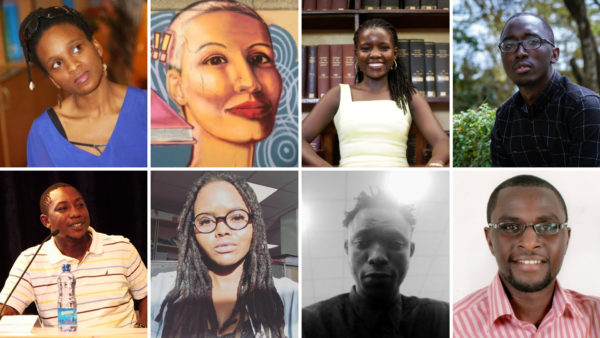
The shortlists for the 2018 Brittle Paper Awards were announced in October. Begun in 2017 to mark our seventh anniversary, the Awards aim to recognize the finest, original pieces of writing by Africans published online.
The $1,100 prize is split across five categories: the Brittle Paper Award for Fiction ($200), the Brittle Paper Award for Poetry ($200), the Brittle Paper Award for Creative Nonfiction ($200), the Brittle Paper Award for Essays & Think Pieces ($200), and the Brittle Paper Anniversary Award ($300) for writing published on our blog. The winners will be announced on Monday, 19 November 2018.
Meet the Finalists for the 2018 Brittle Paper Anniversary Award
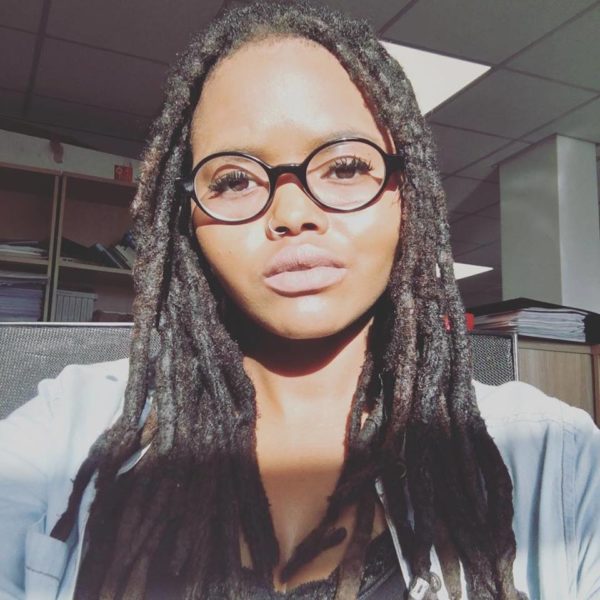
Mapule Mohulatsi (South Africa), for “The Nervous Conditions of the Mother Tongue,” Essay, first published in Selves: An Afro Anthology of Creative Nonfiction
Mapule Mohulatsi is a reader and writer from Johannesburg, South Africa. She is currently completing her master’s in African Literature at the University of the Witwatersrand.
From “The Nervous Conditions of the Mother Tongue”:
I SIT AT the local bar, scared witless, trying to write. I imagine the entangling web of cutthroat opinion pieces that hover above those that can write—the ‘critical eye’. Then, before I can even take the next gulp of beer, the shadow of the consummate reader also loiters before me. Relax, I say to myself. I remind myself that writing is the holy practice where I can, and should, acquaint myself with the sentiments and instincts of writing; those early morning gut reactions, along, of course, with the varied contradictions of what really constitutes humanism and lingual lunacy.
I ask myself whether it is the tongue or the pen that writes.
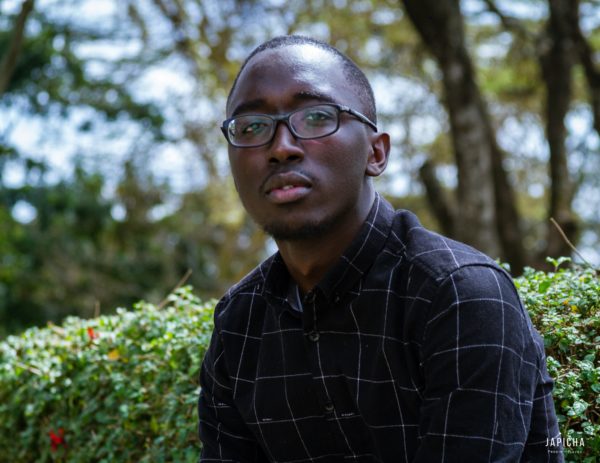
Troy Onyango (Kenya), for “For What Are Butterflies without Their Wings,” Fiction
Troy Onyango’s work has been published or is forthcoming in the Caine Prize Anthology, Wasafiri, Ebedi Review, AFREADA, Kalahari Review, Cosmonauts Avenue, Brittle Paper, and Transition, where his short story, “The Transfiguration,” was nominated for a Pushcart Prize. His short story, “For What Are Butterflies Without Their Wings?,” won the inaugural Nyanza Literary Festival Prize. His nonfiction piece, “This Is How It Ends,” was shortlisted for the 2017 Brittle Paper Award for Creative Nonfiction. Currently, he is studying for an MA in Creative Writing at the University of East Anglia where he is a recipient of a Miles Morland Foundation Scholarship. He is working on a novel and is represented by Elise Dillsworth Agency.
From “For What Are Butterflies without Their Wings”:
April. The heavy rains were here, and the people of Kano were already fleeing from the deluge. From our house on the hilltop, I could see the vast swathes of flooded land that were rice farms. Do you remember that Thursday afternoon when I glanced at the clouds that were dirty cotton puffs hanging from the sky, and told you to stop preparing your fishing net to go into the lake? Rajula wuod Mariko, son of my mother, this was your retort: “Our rains beat us from the East, not the West.” Your tone, sharp and dismissive, stays etched in my memory.
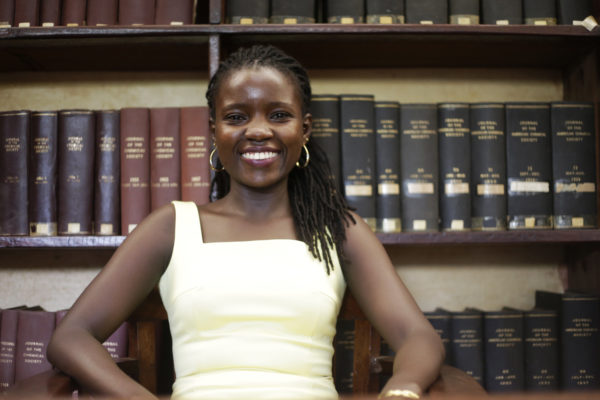
Lillian Aujo (Uganda), for “Jambula Tree,” Poetry
Lillian Akampurira Aujo is a poet and fiction writer based in Kampala, Uganda. She is the winner of the 2015 Jalada Prize for Literature for her story, “Where Pumpkin Leaves Dwell,” and the 2009 Babishai-Niwe Poetry Award for her poem, “Soft Tonight.” Her work has been featured online in Prairie Schooner‘s “Shoes” issue, The Revelator Magazine, Bakwa Magazine, Sooo Many Stories, the Bahati Books anthology Your Heart Will Skip a Beat, Jalada’s Afrofuture(s)anthology, Jalada05/Transition123, and Omenana. Her work appears in print in the Caine Prize 2013 Workshop anthology A Memory This Size; the Femrite anthologies Wondering and Wandering of Hearts, Summoning the Rains, and Talking Tales; and in the Babishai-Niwe publication A Thousand Voices Rising. Her work is forthcoming in Kwani?
Her poetry has been translated to Malayam, and is also set to be taught to Grade 8 students in the Philippines as part of a Contemporary African Poetry class. She has been a mentor in the WritivismAt5 Online Mentoring program. She is a 2017 Fellow of the Ebedi Residency in Iseyin, Nigeria.
From “Jambula Tree”:
Now we are twenty six, in a cafe on a tree-lined street
we sit over Caesar salad and white wine
and Sylvie raises her ring finger to the sun,
‘These hands wash his boxers.’
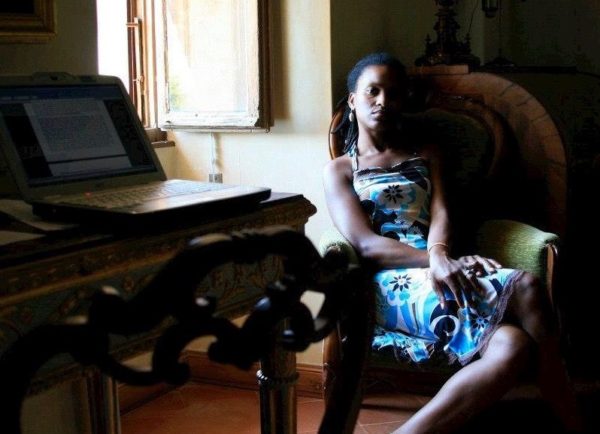
Chika Unigwe (Nigeria), for “Why I No Longer Use the Term ‘Game’ for Bushmeat,” Essay, first posted on Facebook
Chika Unigwe is the author of the novels The Phoenix; On Black Sisters’ Street, which won the 2012 NLNG Prize; and Night Dancer. The Creative Director of the Awele Creative Trust, she was the Bonderman Professor of Creative Writing at Brown University in 2016-2017 and a judge for the Man Booker International Prize in 2016. She was Writer-in-Residence at Haverford College and is the recipient of fellowships from Unesco-Aschberg, the Rockefeller Foundation, HALD, Ledig House, Cove Park, and Sylt.
From “Why I No Longer Use the Term ‘Game’ for Bushmeat”:
Naming is neither innocent nor neutral. Victors name the conquered, the wealthy name the poor. Think about why every westerner in Africa is an “expatriate” and Africans in the west are “immigrants,” and how the labelling influences the dominant narratives around these two groups. Think about why you are a cosmopolitan if you’ve travelled extensively (in the west) and speak a variety of European languages but not if you are Nigerian and have lived/travelled extensively across Africa and speak many African languages.
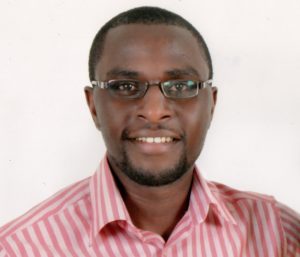
Kamau Muiga (Kenya), for “Bantu’s Swahili, or How to Steal a Language from Africa,” Essay
Kamau Muiga was born in Naivasha, Kenya. He is a graduate student at the University of Nairobi’s Department of Political Science and an Adjunct Lecturer in the social sciences at the Jomo Kenyatta University of Agriculture and Technology (JKUAT) in Nairobi, Kenya.
From “Bantu’s Swahili, or How to Steal a Language from Africa”:
The East African coast still carries these relics from past Swahili glory, such as the Ruins of Kilwa Kisiwani, Songo Mnara, Zanzibar’s Stone Town, and Lamu Old Town in Kenya. One of the most studied Swahili sites by archaeologists from around the world is the Ruins of Gedi in Kenya. Here a flourishing medieval scene has been uncovered by decades of study: a robust town wall, a palace, mosques and tombs of the Gedi elite—an elite that left abundant evidence of enjoying the finer things in life from far and wide, including ceramics, beads and currency from China, India, Persia and the Near East.
When the British invited themselves to the Swahili Coast in the 1880s, they found this Islamic society, this cosmopolitan language, this impressive culture, and concluded that this could not be the work of Africans; it had to be the work of Arabs from the Middle East.
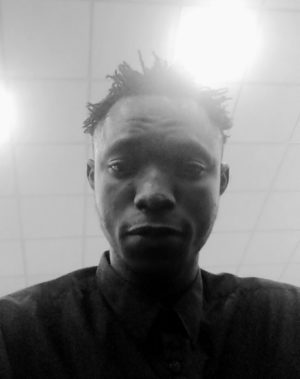
Alaaka Tobi (Nigeria), for “Facebook Writers and Other Trivia,” Essay
Tobi Alaaka’s writing is a meditation on online communities, and their modest potential as emerging forms of resource gathering and sharing, and their capability as sites of political resistance. His work has appeared in Music in Africa and The Native.
From “Facebook Writers and Other Trivia”:
To resume, it is trite to iterate that Facebook—and social media in general—in the dual roles they now occupy, as the new public halls and micro blogging sites, have democratized expression, specifically writing; and may have unwittingly usurped whole, existing publishing institutions and literary gate-keeping; and with unlimited publishing access has also come flimsiness in an otherwise niche craft of writing; and in the prestigious cultural value of wide readership. And is it any surprise that the people quickest to rail at Facebook Writing are invariably experts of the literary stock—usually male and charming? The thought naturally suggests itself that it is not writing per se but the hallowed place of the writer that is under threat from Facebook. A digression, as this piece is foremost about the rigor and detail of older, more respectable literary forms (e.g. the novel & the essay) placed in contrast to the brevity and presumed vacuousness of Facebook Writing.
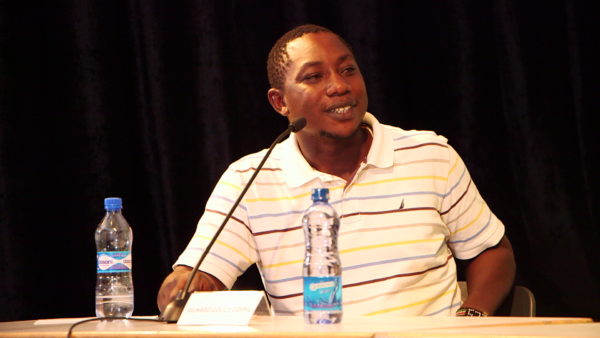
Richard Oduor Oduku (Kenya), for “An African in London and Other Reflections on African Literatures,” Memoir
Richard Oduor Oduku is a post-cynical humanist, a researcher, writer, editor and poet. He studied Biomedical Science and Technology and works as a Research Consultant, in Nairobi. He has been published widely and was longlisted for the 2015 BSFA Awards, and shortlisted for the 2016 Brunel International African Poetry Prize. He is a Founding Member of Jalada Africa, was Program Manager for the Trust, and was the Festival Coordinator for the 2017 Jalada Mobile Festival. He is a Board Member of Youth on the Move (NGO, Kenya), and Nonfiction Editor at Panorama – The Journal for Intelligent Travel, among others.
From “An African in London and Other Reflections on African Literatures”:
I have recently become acutely aware of the value of naming names, of recognizing presence, and even though describing the particulars of each and every presentation is beyond the scope of this little babble, many of the ideas that embattled the 1962 conference are still present today. Among them are the contradictions around the CIA funding of many of the conferences and publications that defined post-independence publishing in Africa. Wole Soyinka commented that they did not know the CIA was the source of funds for the 1962 conference, but joked that had they known, they would have eaten that money properly.
The irony of the reflection of the Makerere Conference being held in London with funding from British institutions was also not lost on me. Even today, most successful literary and art projects in the continent are wholly or partially supported by donor funding. The result, in some cases, is skewed priorities, and a contractual obligation to produce culture that, in some cases, advances the funder’s interests which may be at a variance with the interests of the society where the arts and literatures are being produced.
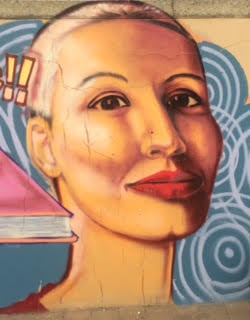
Shailja Patel (Kenya), for “On Postcolonial Theory,” Tweets
Shailja Patel was born and raised in Kenya. She studied Economics and Politics at the University of York (UK), trained as a chartered accountant, and worked in finance in London and San Francisco, before returning home to Nairobi, where she now lives. She is the author of Migritude, based on her acclaimed internationally touring one-woman show. Migritude was a No 1 Amazon poetry bestseller, a Seattle Times bestseller, was shortlisted for Italy’s Camaiore Prize, and is currently taught in over 100 universities.
Patel’s poems have been translated into 17 languages. Her essays and commentaries appear in The Guardian, Le Monde Diplomatique, and Internazionale, among others. She has appeared on BBC, Al-Jazeera, and NPR. She is a recipient of a Sundance Theatre Fellowship, a Voices of Our Nations poetry award, the Fanny-Ann Eddy Poetry Award, and the Nordic Africa Institute African Writer Fellowship. In 2017, she was the official Guest Writer for South Africa’s Jozi Book Fair.
Patel is a founding member of Kenyans For Peace, Truth and Justice, a civil society coalition which works for an equitable democracy in Kenya. The African Women’s Development Fund named her one of “Fifty Inspirational African Feminists,” ELLE India selected her for its “25 New Guard Power List,” and Poetry Africa named her the Letters To Dennis Poet, in honour of anti-Apartheid activist poet Dennis Brutus. She represented Kenya at the London Cultural Olympiad’s Poetry Parnassus. Her work currently features in the Smithsonian Museum’s “Beyond Bollywood” exhibition. Twitter: @shailjapatel.
From “On Postcolonial Theory”:
When you’re a global thought leader whose every eminently quotable clapback makes headlines, but you erase whole bodies of African knowledge and African feminism outside your field, what Africa are you defending? A market? A brand?
— Shailja Patel (@shailjapatel) January 27, 2018
READ: The 2018 Brittle Paper Award for Fiction: Meet the 5 Finalists
READ: The 2018 Brittle Paper Award for Poetry: Meet the 6 Finalists
READ: The 2018 Brittle Paper Award for Essays & Think Pieces: Meet the 7 Finalists
READ: The 2018 Brittle Paper Award for Creative Nonfiction: Meet the 8 Finalists


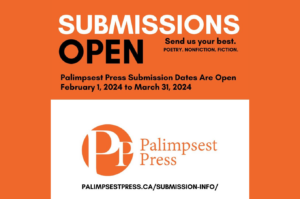


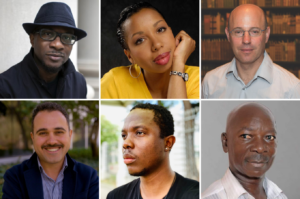
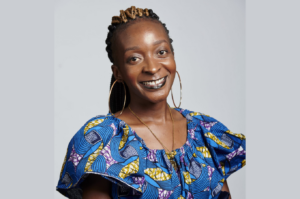
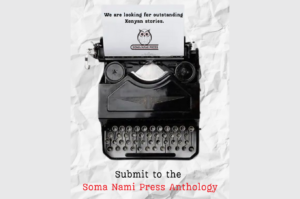

The 2018 Brittle Paper Awards: The Winners – Afrikana Web November 20, 2018 00:31
[…] The 2018 Brittle Paper Anniversary Awards: Meet the 8 […]